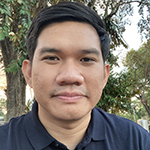People
Sometimes
people assume
that I can only understand
things based on signs
and movements of hand gestures.
The hand in the mouth means food
the number of fingers signify
price or value, repetition.
The performance of the movement
or action shown
to be honest is insulting.
Though they are unaware
of their prejudice
I am consciously judging.
These sons of bitches
look like idiots.
I am smarter than them.
In the end, I still carry
the burden
of understanding.
After all they just want
to get a message across.
Ang Mga Tao
Minsan
ipinagpapalagay
na mauunawaan ko lamang
ang mga bagay sa senyas
at kumpas ng kamay.
Ang kamay sa bibig ay pagkain
ang bilang ng daliri ay bilang
presyo o halaga, pag-uulit.
Ang pag-arte sa ipinapakitang
kilos o paggawa sa totoo
ay nakakainsulto.
Di man sila malay
sa panghuhusga
malay akong nanghuhusga.
Parang tanga
ang mga putang ina.
Mas matalino pa ako sa kanila.
Magkagayon man
nasa akin ang bagahe
ng pag-unawa.
Nais lamang nilang
magtawid ng mensahe.
Translator’s Note:
Lean Borlongan explores disability poetics in the Philippine context, though he doesn’t actively use this label. His poetics lean heavily on the material realities of the country, one that is perpetually in political and economic crisis and alternately lacks the social safety nets for people with disabilities. Borlongan often writes about specific moments in his lived experience, especially affective ones that could be linked to his condition and people’s responses to it. The realization of difference could be immediate or can only be clearer when looking back. The poem ‘People’ belongs to another category, still written in terse and frank verse, where he condenses the sum total of moments, and again arrives at showing both frustration and making do. Because of his accessible language, one might overlook Borlongan’s carefully constructed imagery and tension. In translating, I have attempted to maintain this aura of plainness that actually exposes how deep ableism runs and is considered normal. The poem appears in his second collection, A Different Body (2019), which I have translated in full.

Lean Borlongan graduated from Polytechnic University of the Philippines with a BS in Food Technology and from UP Diliman with a MA in Filipino: Creative Writing. He has authored three poetry books, Sansaglit, sa ibang katawan, and Pasakalye. Pasakalye which was the recipient of the 40th National Book Award and was heralded as the best book in poetry in Filipino by the Manila Critics Circle. He is currently a PhD student in creative writing in Filipino at UP Diliman.

Eric Abalajon’s translations have appeared in Asymptote, Modern Poetry in Translation, Poetry Northwest, Exchanges: Journal of Literary Translation, and Tripwire: a journal of poetics. He lives near Iloilo City in the Philippines.

 BACK TO ISSUE
BACK TO ISSUE